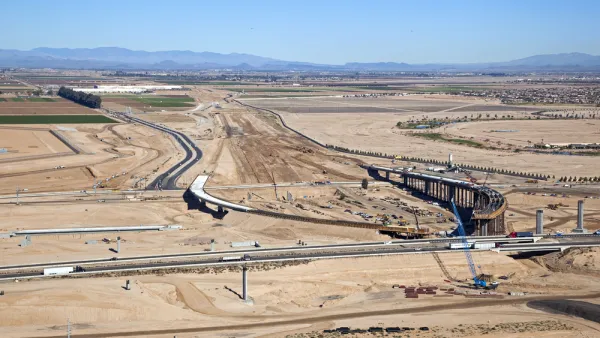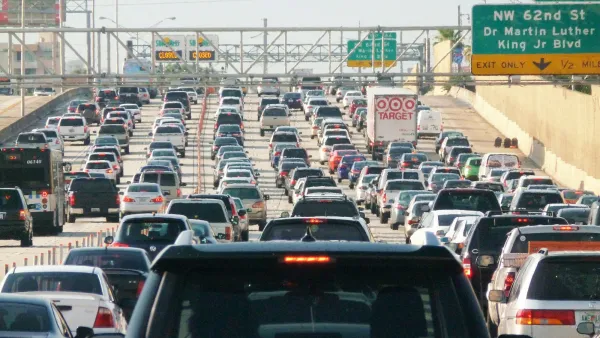The argument is being used to channel climate funding to projects that expand automobile infrastructure, according to an analysis from Transportation for America.

Federal funds aimed at reducing carbon emissions are being used for highway expansion projects, according to an analysis from Transportation for America. As Benton Graham explains in Bloomberg CityLab, the researchers used an AI model to identify projects that expand automotive infrastructure among roughly 60,000 projects nationwide.
The analysis found that a quarter of funds from the Infrastructure Investment and Jobs Act (IIJA)’s Carbon Reduction Program (CRA) are being used for road projects that, according to the organization, “stand to embed high transportation emissions for decades, incentivizing driving and encouraging ever-more-sprawled-out development and land use patterns.”
State agencies, which decide how funds are allocated, claim highway expansions can reduce emissions and air pollution by improving traffic flow and adding energy efficiency upgrades. “But experts point to decades of evidence showing that adding lanes is no fix for congestion, thanks to the well-documented principle of induced demand.” In Houston, peak hour travel times increased three years after a massive $2.8-billion freeway expansion.
“What does work? Policies that deincentivize driving — think stiffer tolls, congestion pricing and zone-based driving fees like London’s Ultra Low Emissions Zone, which charges drivers of high-polluting vehicles.”
FULL STORY: US Climate Funds Pay for Highway Expansion

Analysis: Cybertruck Fatality Rate Far Exceeds That of Ford Pinto
The Tesla Cybertruck was recalled seven times last year.

National Parks Layoffs Will Cause Communities to Lose Billions
Thousands of essential park workers were laid off this week, just before the busy spring break season.

Retro-silient?: America’s First “Eco-burb,” The Woodlands Turns 50
A master-planned community north of Houston offers lessons on green infrastructure and resilient design, but falls short of its founder’s lofty affordability and walkability goals.

Test News Post 1
This is a summary

Analysis: Cybertruck Fatality Rate Far Exceeds That of Ford Pinto
The Tesla Cybertruck was recalled seven times last year.

Test News Headline 46
Test for the image on the front page.
Urban Design for Planners 1: Software Tools
This six-course series explores essential urban design concepts using open source software and equips planners with the tools they need to participate fully in the urban design process.
Planning for Universal Design
Learn the tools for implementing Universal Design in planning regulations.
EMC Planning Group, Inc.
Planetizen
Planetizen
Mpact (formerly Rail~Volution)
Great Falls Development Authority, Inc.
HUDs Office of Policy Development and Research
NYU Wagner Graduate School of Public Service




























